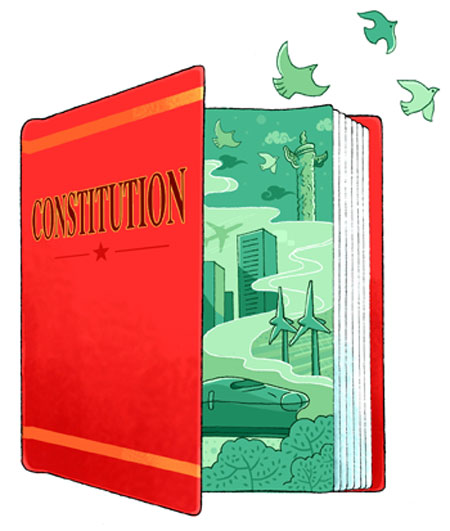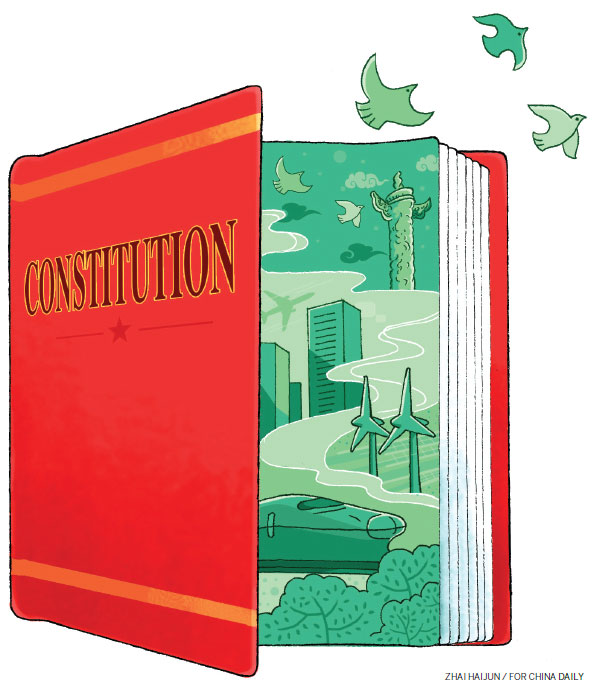Constitution revision vital to new era

China's Constitution, as the fundamental law of the country, is a set of principles for governance and embodies the wishes of the Party and the people. The second plenary session of the 19th Communist Party of China Central Committee proposed amending the Constitution. This is a significant decision made by the CPC Central Committee with Xi Jinping as the core to adhere to and develop socialism with Chinese characteristics in the new era. It also marks a major move to promote the rule of law and the modernization of China's governance system and governance capability.
The incorporation of the significant theories and policies confirmed by the 19th National Congress of the CPC into the Constitution through an amendment reflects the new achievements, new experiences and new requirements of the Party and the nation, and offers a constitutional guarantee to adhere to and develop socialism with Chinese characteristics.
Constitution reflects China's reality and requirements
The extant Constitution was enacted by the fifth plenary session of the 5th National People's Congress, China's top legislature, on Dec 4, 1982, based on the lines, policies and guidelines confirmed by the third plenum of the 11th CPC Central Committee in late 1978. The Constitution highlights the great struggle and fundamental achievements of the Party-led Chinese people's revolution, socialist construction and reform, and celebrates the socialist system. It sets the country's fundamental tasks, leadership core, guiding ideology, development path and the goals of national struggle, and prescribes the CPC-led multiparty cooperation and political consultation system, the regional ethnic autonomy system and the community-level self-governance system, along with a series of significant principles, policies and codes of conducts for the Party and the country that reflect the common will and fundamental interests of the Chinese people of all ethnic groups.
The practices since the 1982 Constitution was enacted have proved that the statute, with its supreme legal status and powerful legal force, has consolidated the Party leadership, ensured that the people run the country, promoted reform and opening-up and the socialist modernization drive, pushed forward the socialist rule of law, and safeguarded national unity, ethnic solidarity and social stability, and has become a fundamental legal guarantee for China and its people to stand up to all kinds of difficulties and risks, march along the socialist path with Chinese characteristics and realize the great rejuvenation of the Chinese nation. A series of systems, principles and rules confirmed and a slew of major policies established by the Constitution have laid a solid foundation for and lent strong vitality to the rule of law, and thus must be upheld and implemented.
Statute's vitality depends on adaptation to new situations
According to historical materialism, law, as an important part of the superstructure, should change with the change in the economic foundation. The same applies to China's Constitution. Since the birth of the first Constitution in 1954, China has been trying to improve the rule of law through practices, while taking some detours in the process.
After the 1982 Constitution was enacted, the NPC, under the leadership of the CPC and on the basis of the practices and development of China's reform and opening-up and its socialist modernization drive, made necessary and important revisions to some of its specific clauses in 1988, 1993, 1999 and 2004, and effected 31 constitutional amendments.
The 9th NPC passed a constitutional revision on March 15, 1999, incorporating Deng Xiaoping Theory into the Constitution, and the 10th NPC made a constitutional revision on March 14, 2004, to include the Theory of Three Represents. A series of other significant systems, theoretical innovations, principles and policies, such as the theories on the primary stage of socialism and the socialist road with Chinese characteristics, as well as socialist market economy and socialist rule of law, have also been incorporated into the Constitution through the four constitutional revisions.
These revisions embody the successful experiences of the Party in leading the Chinese people to carry out reform and opening-up, as well as socialist modernization, highlighting the new development fruits of the road, theory, system and culture of socialism with Chinese characteristics, which has greatly influenced China's political, economic and social development. Thanks to the four revisions, the Constitution has advanced with the times to further the cause of socialism with Chinese characteristics, promote the development of the Party and the nation, and strengthen the socialist rule of law.
A distinctive feature of China's constitutional development is that it must keep pace with the Chinese people's efforts to develop socialism with Chinese characteristics under the Party's leadership. This is the inevitable requirement of the socialist practices in China and a basic law of constitutional development. Only by constantly and timely highlighting the great achievements and valuable experiences of the Party and the people in the Constitution, and giving expression to the new situations and new requirements and development practices, can we enhance the role of the Constitution and allow it to play a greater role in guiding and propelling the nation and the people to achieve the ultimate goal of socialism with Chinese characteristics.
Amendments owing to new socialist reality
Since the constitutional revision in 2004, the development cause of the Party and the nation has undergone important and profound changes. Especially since the 18th Party Congress in late 2012, the CPC Central Committee with Xi Jinping as the core has led the Chinese people of all ethnic groups to unswervingly adhere to and develop socialism with Chinese characteristics, advanced the "five-sphere integrated plan" and the "four-pronged comprehensive" strategy, and promoted the new, great project of Party building, developing a series of new concepts, new thoughts and new strategies on State governance, facilitating historic changes to the cause of the Party and the nation, and bringing socialism with Chinese characteristics to a new era.
Standing at a new historical starting point, the 19th Party Congress decided to make Xi Jinping Thought on Socialism with Chinese Characteristics for a New Era the guiding principle of the whole Party to adhere to and develop socialism with Chinese characteristics in the new era. A series of significant political judgments made by the 19th Party Congress and the new goals of the national struggle it set are of great significance to the development cause of the Party and the nation.
Since the founding of New China, especially since the launching of reform and opening-up, the Constitution has played an important role in the Party's governance of the State. And since the 18th Party Congress, CPC Central Committee General Secretary Xi Jinping has repeatedly stressed the importance of adhering to State governance in accordance with law.
The Constitution is the fundamental and supreme law of the State, and allowing it to play a greater role in State governance is conducive to adhering to and developing socialism with Chinese characteristics in the new era, as well as promoting the rule of law. To do so, we need to make appropriate changes to the Constitution.
The latest decision of the CPC Central Committee to amend the Constitution - in order to highlight the significant theoretical, practical and systematic innovations, especially Xi Jinping Thought on Socialism with Chinese Characteristics for a New Era - will establish a code of conduct for all State work based on repeated and comprehensive considerations. The purpose of such an amendment is to allow the Constitution to better reflect the will of the people, better embody the advantages of the socialist system with Chinese characteristics, and better fulfill the requirements for promoting modernization and the country's governance system and capability.
The writing into the Constitution of the major theoretical and significant policies, including Xi Jinping Thought on Socialism with Chinese Characteristics for a New Era, the realization of national rejuvenation, the perfection of the president's tenure system, and the deepening of national supervisory system reform, is quite necessary and timely. It is of great and far-reaching significance to fully implement the spirit of the 19th Party Congress and Xi Jinping Thought on Socialism with Chinese Characteristics for a New Era, improve State governance, adhere to and develop socialism with Chinese characteristics, and lead the Chinese people to victory in the process.
Constitutional revisions based on Party leadership
The Party's leadership in constitutional revisions must be upheld, as it is the most fundamental guarantee for comprehensively advancing the rule of law and building a law-based socialist society. In China's constitutional development over the past nearly 70 years, the Constitution has been enacted and revised under the Party's leadership. The latest constitutional amendment was also carried out under the unified leadership of the CPC Central Committee with Xi Jinping as the core, reflecting China's confidence in socialism with Chinese characteristics and its path, theory, system and culture.
Any constitutional revision must give full play to democracy and be based on extensive ideas and wisdom. Given that a constitutional revision has overall and far-reaching impact, it must conform to the requirements of the development cause of the Party and the nation, as well as follow the law of constitutional development. In all the constitutional revisions China has made, there was extensive public participation and soliciting of opinions from all walks of life, which ensured the revisions reflected the common will of the Party and Chinese people of all ethnic groups.
A constitutional revision must be conducted according to a specific constitutional procedure and in accordance with law. Under the leadership of the CPC, China has worked out a viable working procedure and mechanism that conform to the spirit of the Constitution. Article 64 of the Constitution stipulates that "constitutional change must be made under the proposal by the Standing Committee of the NPC or more than one-fifth of NPC deputies and passed by more than two-thirds of the votes from NPC deputies". And a Party document stipulates that the CPC Central Committee propose to the NPC any constitutional revision, after which the task should be carried out according to a specific constitutional procedure.
This procedure can be divided into two stages, with the CPC Central Committee proposing a constitutional revision and submitting the proposal to the NPC's Standing Committee for review in the first stage. And in the second stage, the NPC Standing Committee is to organize discussions and work out the constitutional amendment, and submit it to the NPC for its review and passage.
For the latest constitutional revision, the CPC Central Committee held a special plenum for discussions, the first time in the Party's history, fully demonstrating that the CPC Central Committee with Xi Jinping as the core attaches great importance to the constitutional amendment and State governance.
Moreover, since a constitutional amendment must be based on a prudent approach, it should not comprise a major change. The contents of China's Constitution are generally good, and what need to be changed are only part of or supplementary to the Constitution. There is no need to make unnecessary changes to the Constitution so as to maintain constitutional continuity, stability and authority.
Guarantee for socialism with Chinese characteristics
The latest constitutional amendment is to carry out the spirit of the 19th Party Congress under the guidance of Marxism-Leninism, Mao Zedong Thought, Deng Xiaoping Theory, the Theory of Three Represents, Scientific Outlook on Development and Xi Jinping Thought on Socialism with Chinese Characteristics for a New Era, and to write into the Constitution the significant theories and policies confirmed by the congress, especially Xi's thought, to highlight the new achievements, new experiences and new requirements of the development cause of the Party and the nation.
Based on the maintenance of general continuity and stability of the extant Constitution, the latest amendment aims to ensure China's constitutional development and improvement advance with the times and offer constitutional guarantee for adherence to and development of socialism with Chinese characteristics, and to realize the "two centenary goals" and the Chinese Dream of national rejuvenation.
By raising the proposal to amend the Constitution at the second plenary session of the 19th CPC Central Committee, the Party aims to include Scientific Outlook on Development and Xi Jinping Thought on Socialism with Chinese Characteristics for a New Era in the Constitution, and confirm their guiding status in the country's political and social development along with Marxism-Leninism, Mao Zedong Thought, Deng Xiaoping Theory, and the Theory of Three Represents.
It also aims to promote coordinated development of material civilization, political civilization, spiritual civilization, social civilization and ecological civilization, build China into a great modern socialist country that is prosperous, democratic, culturally advanced, harmonious and beautiful, and realize the goal of national rejuvenation, along with a series of other great goals such as building a community of shared future for humankind.
The Constitution's authority lies in its implementation. Full implementation of the Constitution is the primary task and basic work for building China into a law-based socialist country. To amend the Constitution is to better implement it and give it greater say as the fundamental law of the State. The full implementation of the Constitution should be given priority in order to promote the rule of law, and we should strengthen the supervision over the Constitution's implementation to ensure the process enjoys political and systemic guarantee.


